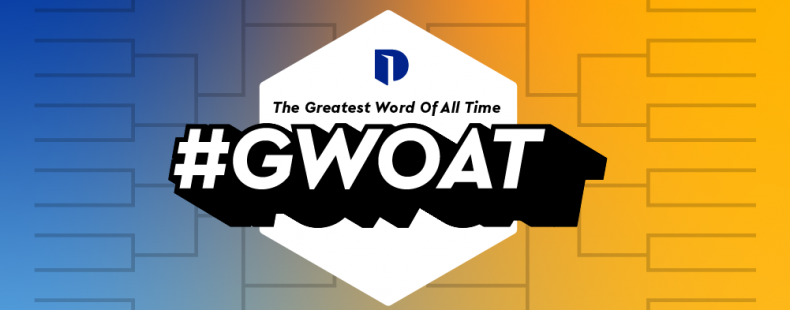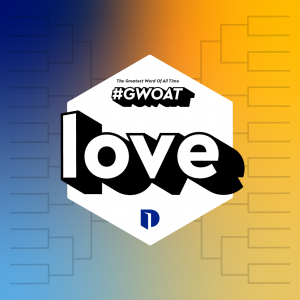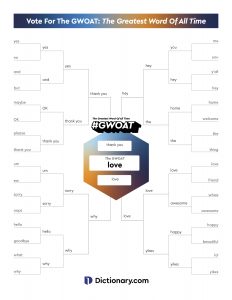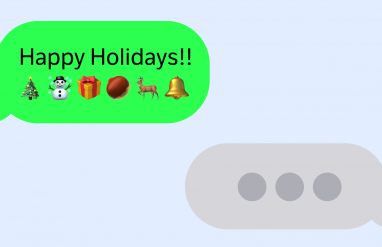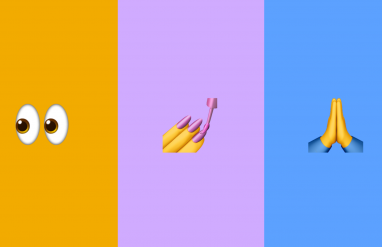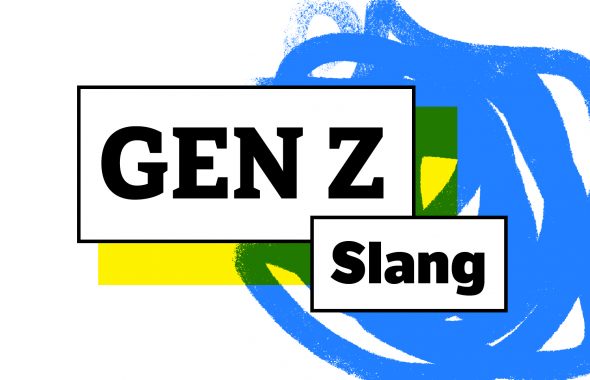by Nick Norlen, Senior Editor
Maybe it was inevitable. And perhaps it was obvious. But honestly, it’s hard not to love it.
We asked the internet public to vote to determine The GWOAT—The Greatest Word Of All Time. After multiple rounds and nearly 14,000 votes, they chose… love.
Allow us, the objective language observers, to be sentimental for a moment.
We acknowledged up front that it’s an absurd question—how could you possibly choose one single word as the “greatest of all time”? But if you had to answer, what word would you choose? Which English word is most objectively important, useful, and irreplaceable? What word, if removed from the lexicon, would leave the biggest void?
To determine the answer, we deliberated on a field of 32 words to choose between, and then opened the Twitter polls to let you vote for the #GWOAT.
Internally, we made predictions about what might win. We had a feeling voters would rally around the power of no—a word so crucial to defining who we are by rejecting the defaults thrust upon us throughout life. And then it lost in the first round… to yes (yeah, maybe we were overthinking it).
In the final matchup, love faced thank you, a term kindred in its good will, though probably too practical and specific to have a chance against lofty, all-encompassing love.
Sure, you might ask: How could anyone not choose love?
But in a world of online polls dominated by whatever the snarkiest or most unserious option is (a Boaty McBoatface world), we think it’s remarkable that the online populace managed to arrive at a consensus on something not just positive, but sincere.
And it wasn’t as if a snarky option wasn’t right there, in the form of yikes—arguably the perfect term for throwing exasperated shade at our tumultuous times. But even when the two went head-to-head, it was still love in a landslide.
Love even outlasted why—“The Ultimate Question,” the pure representation of human curiosity, skepticism, and existentialism. Perhaps the question was survived by its answer.
True, this was a contest between words, not between the things they refer to, but maybe that’s what’s so special about love. The word, when meant, can be the thing.
Of course, most people agree that showing is more important than telling. We’d like to think that the voters recognized love for its value as both a noun and a verb—as not just something to seek and to say between I and you, but as something to do.
The fact that a clear majority chose love as the word they consider most important and essential is, to us, cause for hope.
In retrospect, it does seem inevitable. Of course love won. When the choice is between love and anything else, the choice is obvious.
Download The Bracket (Printable/Editable)
The Final
thank you vs. love
After four rounds, thousands of votes, and some nail-biters, blowouts, and stunning upsets, two words remain in the vote for the #GWOAT. And not just any two words.
The Final pits gratitude champion thank you—unimpeded by its status as a phrase—against undefeated, unconditional, unfailing love. The two terms are kindred in their good will, but only one can be the #GWOAT. Yours may be the deciding vote.
Winner: love (62% of votes)
Semifinal
thank you vs. why
Questions about its eligibility and status as a two-word phrase have only strengthened thank you’s adamant gratitude attitude. The ultimate question for “The Ultimate Question”—why—might now be: “Why not?” The question for you: Which one will you choose?
Winner: thank you (52% of votes)
hey vs. love
Will love conquer all, as it seems destined to do? Or will hey interject and continue its unlikely run toward #GWOAT glory? A spot in the final is at stake, and their fate is in your hands.
Winner: love (63% of votes)
Round 3
yes vs. thank you
So positive. So polite. Don’t let them fool you. Yes and thank you have already KO’d some heavyweights (including OK and and), so don’t expect either one to go down easily.
Winner: thank you (63% of votes)
sorry vs. why
The apologetic meets the existential. Both words are effective even when they stand alone, but which one will remain standing?
Winner: why (58% of votes)
hey vs. the
Hey is underrated, but it’s got effortless range as greeting, attention-getter, accusatory interjection, even empathy signifier (“Hey, you OK?”). The only does one thing, but it does it perfectly and irreplaceably. This could be close.
Winner: hey (57% of votes)
love vs. yikes
Affection versus alarm. Sincerity versus snark. It’s a confrontation of wildly different sentiments, forcing you to choose a side. Watch the winner of this matchup as a potential finalist.
Winner: love (71% of votes)
Round 2
yes vs. and
“Yes-And”—call it the Battle of the Improv Prompt. After beating out their negative counterparts no and but, these two positivity pros find themselves head-to-head. They’re known for working together to affirm and add more, but only one can move on.
Winner: yes (50.5% of votes)
OK vs. thank you
Unrivaled versatility versus gratitude dominance. Can the Swiss Army knife of words manage to cut down the undefeated epitome of expressing appreciation? Oddsmakers are giving OK a slight edge, but will voters risk seeming ungrateful?
Winner: thank you (62% of votes)
um vs. sorry
Um, sorry to the rest of the Round 2 matchups, but this one may be the most fascinating just because of the questions it raises about the intersection of language and human imperfection.
Winner: sorry (63% of votes)
hello vs. why
This is the Round 2 matchup to watch. Hello got the highest percentage of votes of any word in the first round, but it’s up against what many consider to be “The Ultimate Question.” Look for this one to go down to the wire.
Winner: why (60% of votes)
you vs. hey
The first-round victories of both you (over me) and hey (over y’all) came as a surprise to many of our analysts, and it’s even less clear which one will emerge from this round.
Winner: hey (59% of votes)
home vs. the
Home might be riding a wave of warm-and-fuzzies, but there’s nothing fuzzy about cold, hard the, which operates in the realm of the definite. This one’s a mismatch, but in whose favor?
Winner: the (52% of votes)
love vs. awesome
Love reigned supreme in its first-round match against friend, making a case for itself as a favorite to go all the way. Does awesome have the sauce to compete? It’s been counted out before, but it just never seems to go away.
Winner: love (78% of votes)
happy vs. yikes
Wholesome and Snarky factions assemble. Is it possible, in 2023, for a word as pure as happy to take down the interjection that might be the perfect encapsulation of our current times, on what is arguably its home court, the internet? We’re about to find out.
Winner: yikes (50.5% of votes)
Round 1
yes vs. no
It’s a matchup for the ages. Every day and often in profound ways, choices between yes and no form the forks that accumulate into the branching paths of our lives. So what’s it going to be: yes or no?
Winner: yes (66% of votes)
and vs. but
And gives us the precious opportunity to keep going, to add additional thoughts, and requests, and items in a list, and whatever else we want to say next. But but crucially allows us to hit the brakes, to introduce contradictory information or an alternative position.
Winner: and (61% of votes)
maybe vs. OK
Maybe is a true blessing: an easy way to be noncommittal. OK is a miracle of near universality and world-class versatility: it can be an adjective, adverb, interjection, noun, and verb (not to mention having a fascinating origin story).
Winner: OK (66% of votes)
please vs. thank you
The “magic word” itself, please is the key to polite requests and earnest pleas alike. It’s matched up against the term at the other end of such interactions: thank you, the reigning champion of gratitude (yes, technically it’s a phrase, but it functions like a single-word interjection).
Winner: thank you (66% of votes)
um vs. ew
Um gets a bad reputation as the ultimate “filler word,” but try to imagine life without it, with nothing but awkward pauses to resort to when we’re grasping for what to say next. As for ew: just try to express disgust more efficiently.
Winner: um (68% of votes)
sorry vs. oops
The world would be a far worse place without a concise way to acknowledge a mistake. There is power in a single, sincere sorry, just as there is catharsis in a well-placed oops. Bonus: both can be wielded sarcastically to searing effect.
Winner: sorry (68% of votes)
hello vs. goodbye
Is there a word more fundamental to what it means to be human than hello? Perhaps there is, and perhaps it’s goodbye. No one likes to say it, but at some point, we all have to.
Winner: hello (78% of votes)
what vs. why
It’s hard to fathom life without either of these indispensable interrogatives, both essential for posing questions practical and existential.
Winner: why (62% of votes)
me vs. you
It’s first person against second person. But remember: everyone is a me and a you, depending on the point of view.
Winner: you (72% of votes)
y’all vs. hey
The word y’all, once only a regional favorite of collective address, has broken onto the national scene. But don’t sleep on hey, whose underrated range allows it to pivot from familiar greeting (“Hey!”) to accusatory attention-getter (“Hey!”).
Winner: hey (58% of votes)
home vs. welcome
Through some kind of linguistic alchemy, home is imbued with the ability to impart some of the same warm feeling of comfort provided by the place itself. Welcome, central to the sacred tradition of hospitality, is proof of the best that we’re capable of.
Winner: home (59% of votes)
the vs. thing
A real grammarian’s matchup: the definite article versus the stand-in for any item, tangible or abstract. Good luck getting the English language to function without either of these ubiquitous terms.
Winner: the (70% of votes)
love vs. friend
The basis of entire genres of songs, stories, and letters, love is renowned for its use as both a noun and—most famously between I and you—a verb. Love itself may be beloved, but don’t discount the joy of calling someone a friend—and of having the word applied to you.
Winner: love (63% of votes)
whoa vs. awesome
This matchup pits pop culture darling whoa against longtime favorite awesome. The latter may seem played out, even after besting cool to make the GWOAT tournament, but don’t underestimate its continued prominence in our informal vocabulary.
Winner: awesome (54% of votes)
happy vs. beautiful
In a field short on adjectives, either one of these perennially popular descriptors could draw the support of those who prize positivity.
Winner: happy (58% of votes)
lol vs. yikes
The inclusion of lol is sure to rile up the purists, begging the question of whether it’s even a word (and whether we just used begging the question properly lol). And then there’s yikes, a potential dark horse and, according to one analyst, “the Boaty McBoatfaciest competitor in the bracket.”
Winner: yikes (61% of votes)
